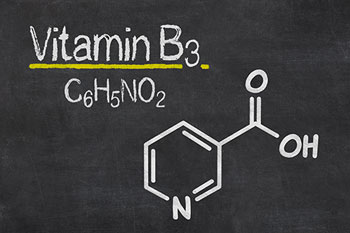
Niacinamide
(nī-ə-ˈsi-nə-ˌmīd) n. 1. The amide of niacin, occurring naturally in the body and inter-convertible with niacin, found especially as a constituent of coenzymes. Synonyms: Benzyl Nicotinate, nicotinamide, vitamin B3, nicotinic acid, C6H6N2O, Pyridine-3-carboxamide. Derivation: From ni(cotinic) ac(id) + -in2 and am(monia) + -ideSource
Niacinamide is a form of Vitamin B3 that is found in many foods. Meat, fish, eggs, green vegetables, cereal grains, beans and yeast are all natural sources of niacinamide. It is also found in many supplements with B vitamins.Benefits
Niacinamide does not cause flushing of the skin the way that niacin does. It is approved by the FDA for the treatment of certain conditions related to niacin deficiency, such as pellagra. Taking niacinamide is thought to improve joint flexibility and reduce both pain and swelling, and thus may help with osteoarthritis due to its anti-inflammatory properties.Uses
Early research indicates that niacinamide may be useful in the treatment of osteoarthritis. It is also used in skin care products, particularly in anti-aging products. It is also used to help with alcohol dependence, anemia, anxiety, joint inflammation, dementia, hearing loss, insomnia, migraine headaches, menstrual pain, wound healing and sexual arousal.Forms (delivery methods)
Niacinamide is available in liquid form, tablets, capsules and powder.Side Effects
Side effects in normal doses are minimal. Upset stomach, nausea and diarrhea may occur.Research:1 A Double-Blind, Randomized Clinical Trial of Niacinamide 4% versus Hydroquinone 4% in the Treatment of Melasma
https://www.ncbi.nlm.nih.gov/pmc/articles/PMC3142702/2 Niacin (vitamin B3, nicotinic acid), Niacinamide
http://www.mayoclinic.org/drugs-supplements/niacin--niacinamide/evidence/hrb-20059838
